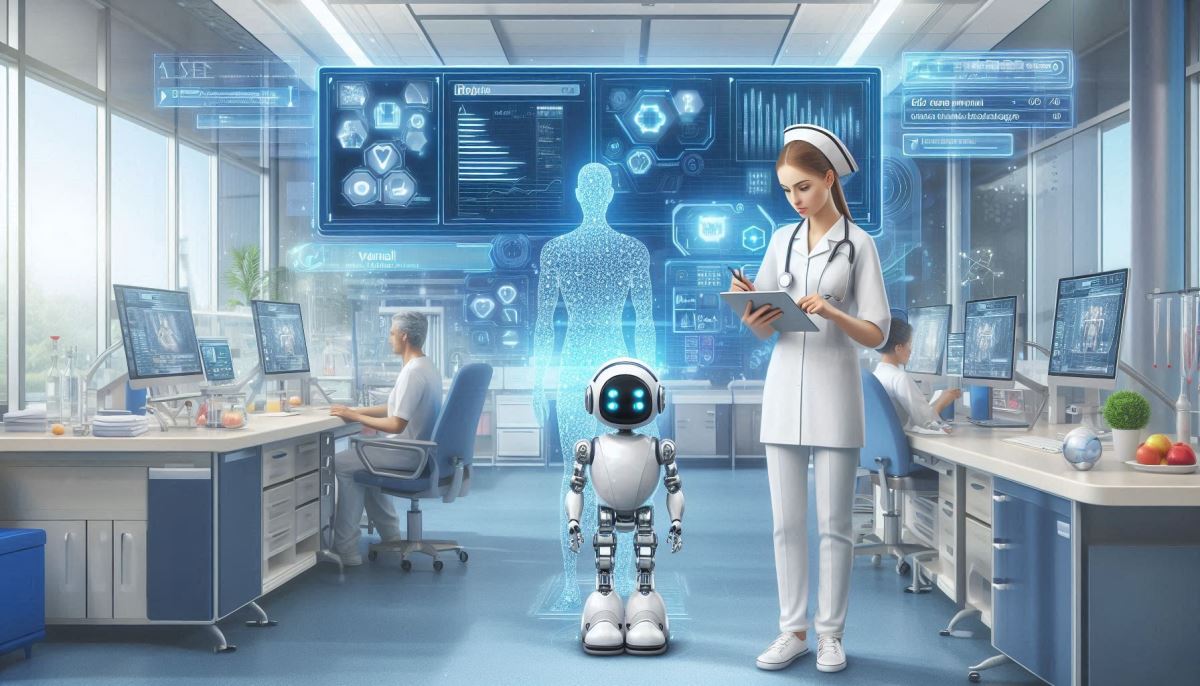Artificial Intelligence (AI) is making significant strides in various fields, including healthcare. In nursing, AI is enhancing patient care, streamlining administrative tasks, and improving decision-making processes. This article explores how AI is being utilized Artificial Intelligence in nursing, its benefits, challenges, and future prospects.
Overview of AI in Healthcare
AI refers to computer systems designed to perform tasks that typically require human intelligence. These tasks include learning, reasoning, problem-solving, and understanding language.
In healthcare, AI can analyze vast amounts of data, recognize patterns, and provide insights that can help improve patient outcomes.
Applications of Artificial Intelligence in Nursing
1. Predictive Analytics
Predictive analytics involves using historical data to forecast future events. In nursing, AI can analyze patient data to predict potential health issues, enabling proactive care.
- Example: Machine learning algorithms can predict patient deterioration by analyzing vital signs and other clinical data.
2. Clinical Decision Support Systems (CDSS)
CDSS are AI-driven tools that assist healthcare providers in making informed decisions based on patient data and clinical guidelines.
- Example: AI can alert nurses about potential medication errors or suggest alternative treatments based on patient history.
3. Telehealth and Virtual Assistants
Telehealth platforms and virtual assistants powered by AI can enhance remote patient monitoring and improve accessibility.
- Example: AI chatbots can answer patient queries, schedule appointments, and even monitor symptoms, freeing up nurses to focus on more critical tasks.
4. Automated Documentation
AI can help reduce the time nurses spend on paperwork by automating documentation processes.
- Example: Natural Language Processing (NLP) tools can transcribe and organize patient notes, allowing nurses to devote more time to patient care.
5. Personalized Care Plans
AI can analyze patient data to create tailored care plans that meet individual needs.
- Example: Algorithms can identify the most effective interventions based on a patient’s unique medical history and preferences.
Benefits of Artificial Intelligence in Nursing
| Benefit | Description |
|---|---|
| Improved Patient Outcomes | AI can enhance decision-making, leading to better patient care and recovery. |
| Increased Efficiency | Automation of routine tasks allows nurses to focus on direct patient care. |
| Enhanced Accuracy | AI reduces the likelihood of human errors in medication and treatment plans. |
| Data-Driven Insights | AI can analyze large datasets to identify trends and inform healthcare policies. |
Challenges of Implementing AI in Nursing

While the benefits of Artificial Intelligence in nursing are significant, several challenges exist:
1. Data Privacy and Security
The use of AI requires access to sensitive patient data, raising concerns about data security and privacy.
2. Integration with Existing Systems
Integrating AI solutions with existing healthcare systems can be complex and costly.
3. Resistance to Change
Some nursing staff may be hesitant to adopt AI technologies, fearing job displacement or loss of human touch in care.
4. Need for Training
Effective use of AI tools necessitates training for nurses, which can be time-consuming and resource-intensive.
Current Nursing Issues: A Comprehensive Overview
Future Prospects of Artificial Intelligence in Nursing
The future of AI in nursing holds immense potential. As technology continues to advance, AI could play a pivotal role in:
- Enhanced Diagnostics: AI algorithms may improve diagnostic accuracy by analyzing imaging and lab results.
- Robotics in Nursing: Robots may assist nurses with physical tasks, such as lifting patients and delivering medications.
- Continuous Learning: AI systems can continually learn from new data, improving their effectiveness over time.
The Critical Care Nurse Practitioner: A Comprehensive Overview
Frequently Asked Questions (FAQ)
Conclusion Artificial Intelligence in Nursing
AI is transforming nursing by improving patient care, enhancing efficiency, and providing data-driven insights. While challenges exist, the potential benefits of AI are immense.
By embracing these technologies, the nursing profession can enhance its capabilities and continue to provide high-quality care to patients.




One thought on “Artificial Intelligence in Nursing: Transforming Patient Care”